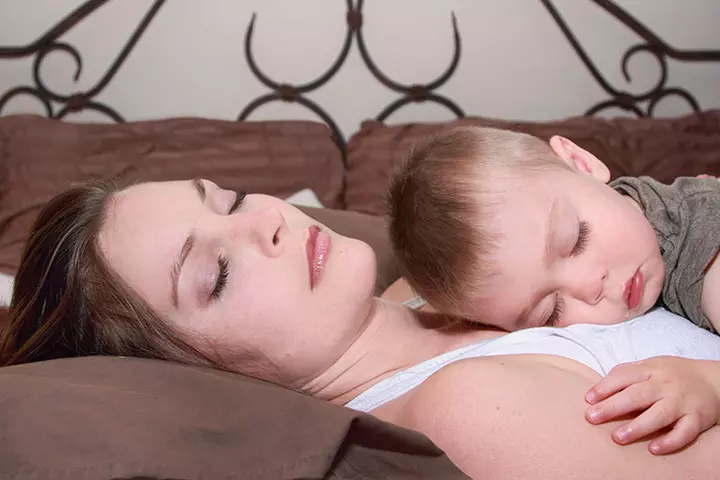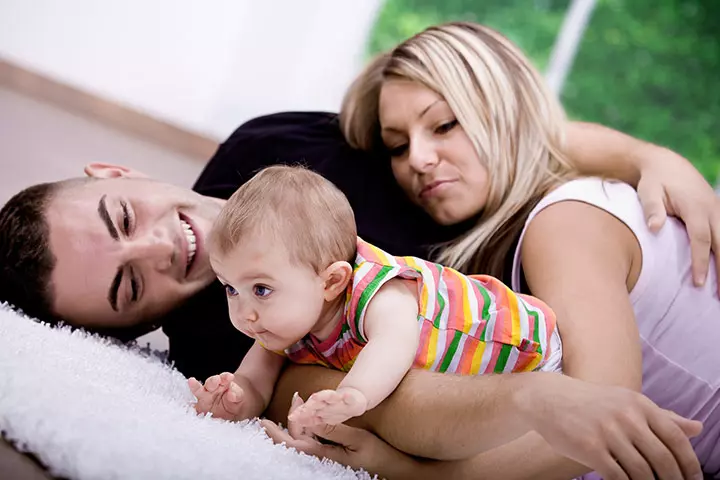

Image: Shutterstock
Once a baby is born, the mother and child are almost inseparable – be it their waking hours or sleep time. And co-sleeping has very much been a part of a majority of cultures. This might seem quite natural considering that babies extensively rely on the mother for all their needs. However, of late, co-sleeping has come under the scanner regarding the potential risks that it might pose. Here are 10 such things, therefore, that moms need to know about bed sharing:
1. No Need For Pillow Support
Image: Shutterstock
Every time a mom puts her little one in a cradle/crib, she’ll stuff enough number of pillows and blankets around to ensure that the baby is safe. Yet, these very pillows and blankets become a huge suffocation hazard. But when your baby sleeps with you, you’ll eliminate the need for these things. What can be a better support than a mother herself!
2. Improves Skin-To-Skin Contact
Image: Shutterstock
The skin-to-skin contact between the mother and the newborn is considered to be very essential for the overall development of the baby (1). Babies cannot express themselves, but they feel the most secure when they are around their mothers. And what’s better than that? Extended hours of being around the mother, of course!
3. Not All Statistics Are Accurate
Image: Shutterstock
Did a ‘recent’ survey about the potential dangers of co-sleeping disturb you? You’ll need to understand that not all such surveys are accurate. These are generally based on questionnaires and most mothers are not comfortable admitting facts. You might take a few tips into consideration, but do not take the results of such surveys as the final word.
4. The Mother’s Instinct
Image: Shutterstock
The biggest concern of co-sleeping is based on the assumption that a tired mother might end up rolling over and suffocating her little one. Possible? Maybe. However, a mother’s protective instincts toward her baby are very strong. So, it is quite unimaginable that she’ll pose a threat when she is capable of waking to even the feeblest of cries. Still, if you are concerned, make sure you put your baby at a safe length or in a crib on days you are extremely tired to co-sleep.
5. Helps On-Demand Feeding
Image: Shutterstock
Babies have tiny stomachs that fill as easily as they empty, which obviously makes them wake up often during nighttime. Co-sleeping helps you keep up with on-demand feeding immediately without having to get up from the bed or bending over to pick your baby.
6. You Can Respond Promptly To Their Needs
Image: Shutterstock
Since babies’ immunity is yet to develop, it makes them ill quite frequently. During such times when your baby might be suffering from fever or minor illnesses, having you close to him/her gives your baby a sense of security. This, in turn, helps them calm down easily and you can attend to their needs promptly.
7. Mother Can Sleep Better
Image: Shutterstock
According to research, breastfeeding mothers who co-sleep with their babies tend to sleep much better. Although they seemed to wake up quite often to feed, the research concluded that breastfeeding mothers slept more when they co-slept with the newborn. However, bottle-feeding mothers’ sleep was not affected by the location where the baby slept (2).
8. Bedsharing Is Common In Some Cultures
Image: Shutterstock
Like mentioned earlier, bedsharing is quite the norm in most cultures, especially in Asian and East Asian countries like India, Japan, etc., without any major fatal outcomes. In fact, a study even found that mothers of Hispanic and other ethnic origins co-sleep with their kids up to 3 years of age with no adverse effects on the child’s behavior or cognitive skills (3).
9. When To Avoid
Image: Shutterstock
If you have been through a complicated childbirth procedure or a surgery that required the use of anesthesia, it is advisable that you avoid co-sleeping with your baby. Some medicines and surgical anesthesia might leave you with a drowsy effect, proving to be potentially harmful to your baby. In such a situation, ensure that either your spouse or a family member, like your mother, take over the baby’s responsibilities for a while.
10. Improves Bonding
Image: Shutterstock
In today’s time and age, where both parents might be working, finding family-bonding time might become a luxury. This is where co-sleeping helps. When you head to your bedroom at the end of the day, you are done with all the chores and in a relaxed state of mind. And having your baby sleeping with you helps you bond better with him/her.
We hope that these points have helped clear some of your doubts regarding co-sleeping with your baby. What do you think about mother-baby co-sleeping? Share your thoughts and experiences in the comments section below!
Community Experiences
Join the conversation and become a part of our nurturing community! Share your stories, experiences, and insights to connect with fellow parents.























